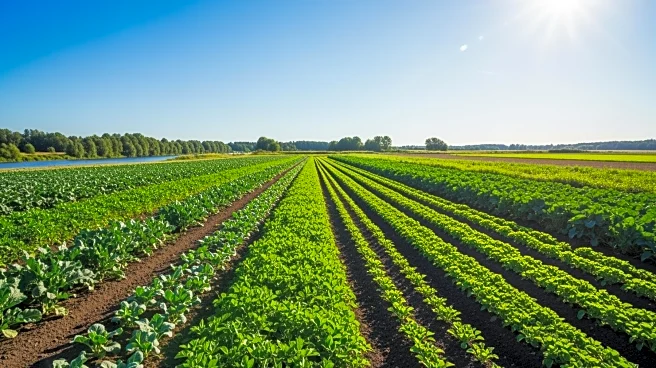What's Happening?
Sterling Bank Limited has reaffirmed its commitment to enhancing food security and sustainable agriculture in Africa, coinciding with World Food Day 2025. The bank emphasizes the importance of collaboration among farmers, financiers, policymakers, and communities
to address food insecurity. Olushola Obikanye, Group Head of Agriculture at Sterling Bank, highlighted the need for partnership-driven solutions to transform Africa's food systems. Sterling Bank has been a significant financier of agricultural development in Nigeria, disbursing over N500 billion in loans to commercial farmers and $300 million to support agricultural value chain actors. The bank's initiatives include SWAY AgFin, a digital platform that has enabled over 25,500 youth and women farmers to access financing and market opportunities.
Why It's Important?
The commitment by Sterling Bank to food security and sustainable agriculture is crucial for Africa, which holds 60% of the world's uncultivated arable land yet imports billions of dollars worth of food annually. By fostering partnerships and providing financial support, Sterling Bank aims to transform the agricultural landscape, improve nutrition, and secure a better future for generations. This approach not only addresses food insecurity but also promotes economic growth and community empowerment. The bank's focus on empowerment, innovation, and sustainability through climate-smart agriculture is expected to yield better livelihoods and stronger communities.
What's Next?
Sterling Bank plans to continue its efforts in building a resilient agricultural ecosystem by empowering farmers with access to credit, markets, and knowledge. The bank's strategy involves long-term agricultural transformation through empowerment, innovation, and sustainability. As Africa moves towards making food security a continental priority, Sterling Bank's initiatives are likely to play a significant role in reducing food imports and enhancing local production. The bank's ongoing collaboration with financial institutions, technology providers, and development partners is expected to drive further advancements in Africa's agricultural sector.
Beyond the Headlines
Sterling Bank's focus on sustainable agriculture and food security highlights the ethical and economic dimensions of addressing hunger in Africa. By leveraging technology and financial resources, the bank is contributing to a shift towards more sustainable and inclusive agricultural practices. This approach not only tackles immediate food security challenges but also promotes long-term environmental sustainability and economic resilience. The bank's initiatives may serve as a model for other financial institutions seeking to make a positive impact in the agricultural sector.















